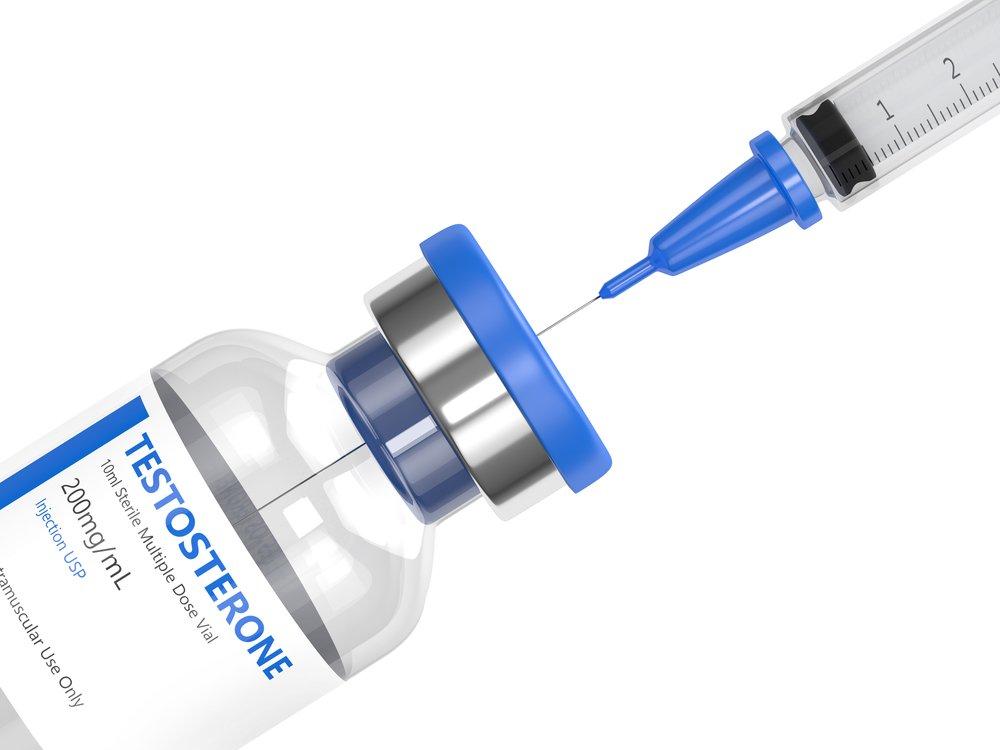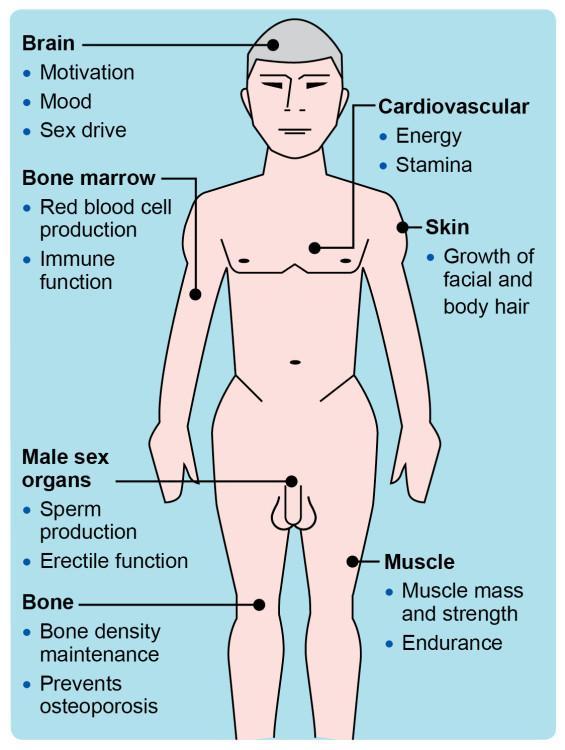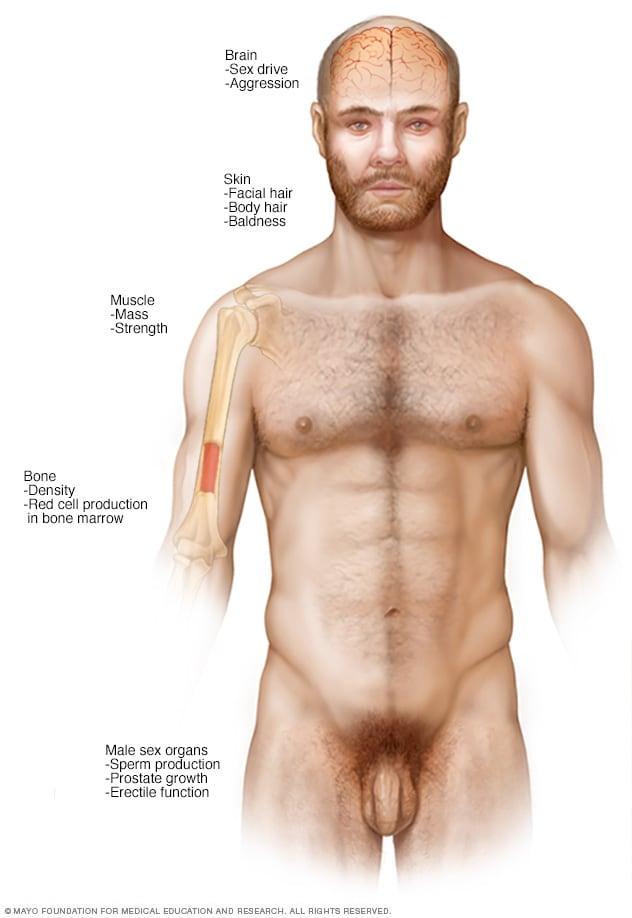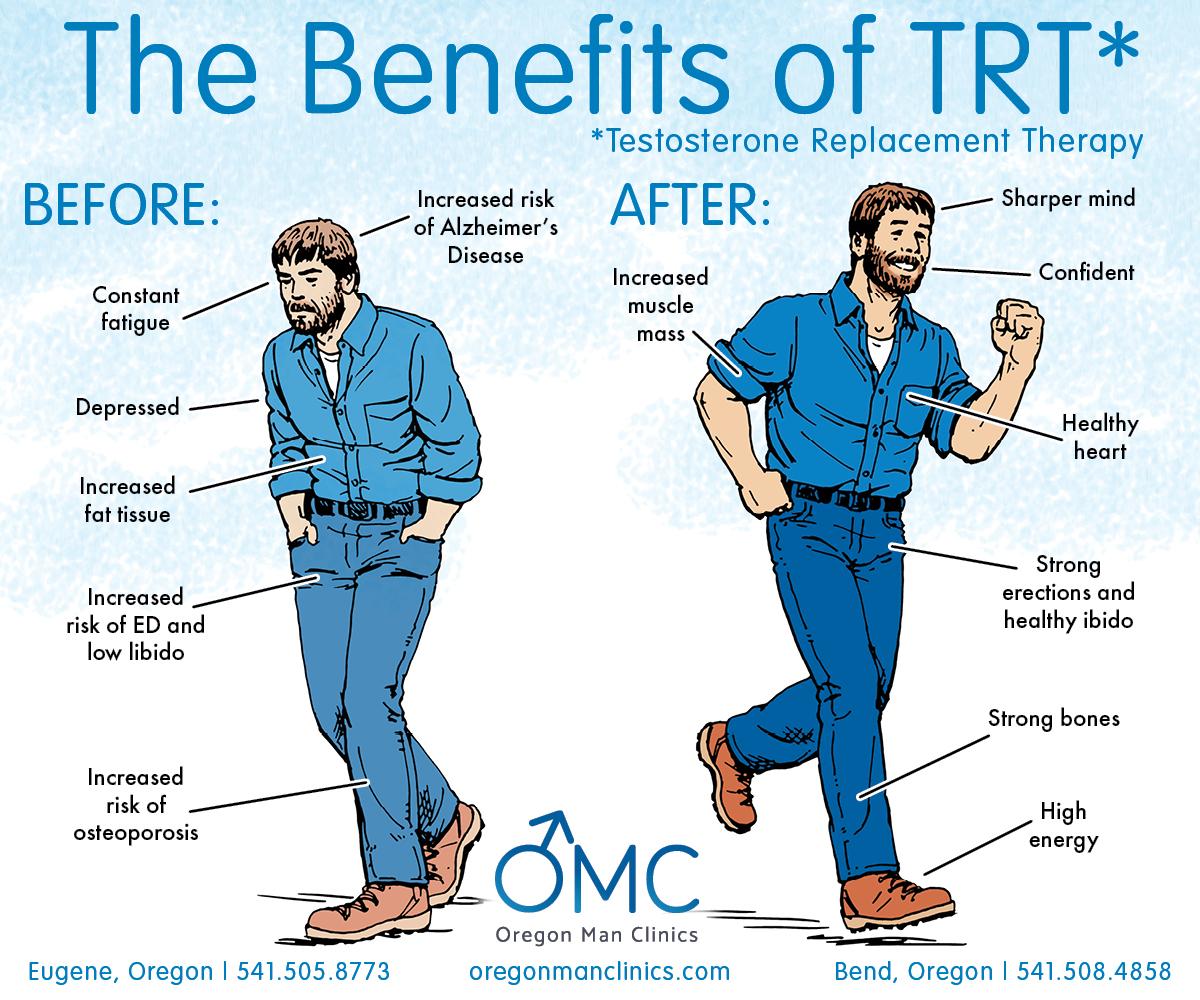In an age where wellness and vitality have become paramount, the conversation surrounding hormone health is gaining unprecedented attention—none more so than the exploration of testosterone therapy for men. Once shrouded in stigma and misconceptions, this therapeutic approach is emerging as a beacon of hope for those grappling with the effects of declining testosterone levels. As men age, the natural decrease of this vital hormone can lead to a host of challenges, from diminished energy and lowered libido to mood fluctuations and muscle loss. Yet, beneath the surface of these struggles lies a potential renaissance through testosterone therapy. This article delves into the multifaceted benefits of testosterone therapy, illuminating its role in enhancing the lives of men while navigating the complexities of treatment options, potential risks, and the impact on overall health. With a balanced perspective, we aim to uncover how this therapy could serve as a pathway to renewed vigor and well-being.
Understanding Testosterone and Its Role in Male Health
Testosterone, often referred to as the male hormone, plays a vital role in various physiological processes that contribute to overall health in men. It is fundamental not only for the development of masculine traits but also for maintaining muscle mass, bone density, and a healthy libido. Low testosterone levels can lead to several health issues, including fatigue, depression, and decreased cognitive function. Many men seeking to enhance their well-being find that testosterone therapy can be a transformative solution that addresses these concerns effectively.
The benefits associated with testosterone therapy are numerous and can significantly improve quality of life. Some of the key advantages include:
- Increased Energy Levels: Many men report feeling more energetic and motivated.
- Improved Mood: Testosterone can help alleviate symptoms of depression and anxiety.
- Enhanced Muscle Mass: Therapy can aid in the development of lean muscle, crucial for overall strength.
- Better Bone Health: Increased density can reduce the risk of fractures.
- Improved Sexual Function: Testosterone boosts libido and addresses erectile dysfunction.
To further highlight the advantages, consider the following table that outlines expected changes pre-and post-therapy:
| Aspect | Before Therapy | After Therapy |
|---|---|---|
| Energy Levels | Low | Increased |
| Mood | Irritable | Stable |
| Muscle Mass | Declining | Gaining Strength |
| Libido | Decreased | Enhanced |
testosterone therapy holds the potential to restore vitality and improve the health of men suffering from low testosterone levels, ensuring they live life to the fullest.

Exploring the Physical Benefits of Testosterone Therapy
Testosterone therapy has emerged as a beacon of hope for men experiencing the debilitating effects of low testosterone levels, often referred to as low-T. One of the most immediate and noticeable benefits of this therapy is an increase in overall muscle mass. Testosterone plays a crucial role in the development and maintenance of muscle tissues, leading to improved strength, endurance, and physical appearance. Regular testosterone therapy can help men reclaim their vitality through:
- Enhanced muscle strength: Boosting physical performance in daily activities and workouts.
- Fat loss: Promoting a leaner physique by reducing body fat percentage.
- Bone density improvement: Minimizing the risk of osteoporosis and related issues.
Apart from muscle and fat composition, testosterone therapy has significant implications for men’s cardiovascular health. Studies have shown that adequate testosterone levels are correlated with better heart health outcomes. Testosterone may improve blood flow and vascular function, which can lead to enhanced exercise capacity and reduced risk of cardiovascular diseases. Consider the following benefits:
| Physical Benefit | Impact on Overall Health |
|---|---|
| Improved lipid profiles | Lower cholesterol and triglycerides promote heart health. |
| Increased energy levels | Enhances daily activities and overall life quality. |
| Better mood regulation | Reduces feelings of fatigue and mental exhaustion. |

Mental Clarity and Mood Enhancement Through Hormone Replacement
Hormone replacement therapy, particularly testosterone therapy, has been recognized for its potential to enhance mental clarity and improve mood in men. By carefully restoring testosterone levels to optimal ranges, individuals may experience a significant cognitive boost. Improved concentration, sharper memory, and enhanced decision-making abilities can all stem from adequate hormone levels. This is particularly crucial as men age, with declining testosterone often linked to brain fog and cognitive decline.
In addition to cognitive benefits, testosterone therapy can bring about notable changes in mood. Many men report reduced symptoms of depression, increased motivation, and a more positive outlook on life following treatment. This uplifting effect can contribute to heightened overall well-being, allowing men to feel more engaged in daily activities and personal relationships. The multifaceted benefits of hormone replacement create a foundational impact on mental health that cannot be overlooked.

Impact on Sexual Health and Libido: What to Expect
Testosterone therapy can significantly enhance male sexual health and libido, offering a myriad of benefits that target the core of men’s intimate lives. As testosterone levels decline with age, many men report a decrease in sexual desire and performance. Through properly administered testosterone therapy, men often experience:
- Increased libido: A noticeable boost in sexual desire is one of the most immediate effects.
- Improved erectile function: A stronger and more sustained erection is frequently reported.
- Enhanced sexual satisfaction: Men often describe a more fulfilling sexual experience.
The positive impact of testosterone therapy isn’t just about desire; it also promotes overall confidence and mental well-being. When men’s testosterone levels are optimized, they may encounter improvements in mood and energy levels, further fueling their ability to engage intimately. Evidence shows that:
- Lower stress levels: Men often feel more relaxed, which can lead to improved sexual performance.
- Higher motivation: A reinvigorated sense of drive can enhance both physical and sexual engagement.
| Benefit | Description |
|---|---|
| Increased Libido | Revitalized desire for sexual activity. |
| Enhanced Performance | Improved ability to achieve and maintain erections. |
| Emotional Well-being | Boosted mood and reduced anxiety during intimate moments. |
Improved Energy Levels and Vitality with Testosterone Therapy
Many men experience a noticeable decline in their energy levels as they age, often attributing it to stress or lifestyle choices. However, one of the underlying factors can be low testosterone levels. Testosterone therapy has been shown to enhance overall energy and vigor, allowing men to reinvigorate their daily lives. It can help combat fatigue and lethargy, restoring not just physical vitality but also mental clarity and motivation.
After initiating testosterone therapy, many individuals report a significant improvement in their stamina and enthusiasm for various activities. The benefits extend beyond just feeling more energetic; they often include:
- Improved physical performance: Enhanced strength and endurance, benefiting workouts and daily tasks.
- Heightened mental alertness: Increased focus and sharper cognitive functions.
- Enhanced mood: Reduction in symptoms of depression and anxiety.
In some cases, providers may track progress through a simple table that outlines changes in energy levels, exercise capacity, and mood improvements over time:
| Time Frame | Energy Level (1-10) | Exercise Capacity (minutes) | Mood Rating (1-10) |
|---|---|---|---|
| Before Therapy | 4 | 20 | 5 |
| 1 Month | 6 | 30 | 6 |
| 3 Months | 8 | 45 | 8 |
Navigating the Risks and Considerations of Treatment
While testosterone therapy can offer significant benefits for men experiencing low hormone levels, it is essential to approach treatment with caution. Potential risks include cardiovascular issues, increased red blood cell count, and mood fluctuations. It’s crucial to have a comprehensive evaluation performed by a healthcare professional to determine the appropriateness of therapy based on individual medical history and lifestyle factors. Regular monitoring and adjustments may be necessary to minimize risks and ensure optimal outcomes.
Considerations should also include the psychological impacts of treatment. Men undergoing testosterone therapy might experience enhanced mood and energy, but the possibility of side effects like anxiety and irritability must not be overlooked. Prior to starting treatment, open discussions with your healthcare provider about the balance between the benefits and potential drawbacks can help tailor a plan suitable for your unique needs. Key points to consider include:
- Medical history: Understanding pre-existing conditions.
- Age and lifestyle: How these factors influence treatment suitability.
- Goals of therapy: What you wish to achieve through testosterone therapy.
| Potential Benefits | Possible Risks |
|---|---|
| Improved libido | Increased risk of sleep apnea |
| Enhanced muscle mass | Potential heart complications |
| Greater energy levels | Changes in mood |
Tailoring Your Testosterone Therapy: Finding the Right Approach
Testosterone therapy is not one-size-fits-all; it requires a customized approach to deliver its full range of benefits. Factors such as age, overall health, and lifestyle play critical roles in determining the right form and dosage of treatment. Specialists often recommend starting with comprehensive blood tests to gauge current hormone levels, which can inform whether a patient requires therapy and, if so, which method may suit them best. Options include:
- Injections: Administered bi-weekly or monthly, providing rapid boosts in testosterone levels.
- Gels or Patches: Allow for gradual absorption through the skin, promoting stable hormone levels.
- Pellets: Implanted under the skin, these release testosterone over several months for a steady supply.
When considering therapy, it is essential to have ongoing consultations with a healthcare provider to monitor progress and adjust treatment as needed. Potential side effects—such as mood swings, sleep apnea, or changes in cholesterol levels—should be discussed openly. Regular check-ups can help ensure that any adverse reactions are managed effectively, while also allowing for modifications to maximize the therapy’s benefits. The table below outlines key areas to monitor during the treatment process:
| Aspect to Monitor | Frequency |
|---|---|
| Hormone Levels | Every 3-6 months |
| Cholesterol and Lipid Profile | Every 6 months |
| Mood and Energy Levels | Monthly |
Q&A
Q&A: Exploring the Benefits of Testosterone Therapy for Men
Q1: What exactly is testosterone therapy?
A1: Testosterone therapy is a medical treatment designed to boost testosterone levels in men who have low levels of this hormone. It can be administered through injections, patches, gels, or pellets that are placed under the skin. The aim is to restore testosterone to a normal range, which may help address various health concerns.
Q2: Who qualifies for testosterone therapy?
A2: Generally, testosterone therapy is recommended for men diagnosed with hypogonadism, a condition where the body doesn’t produce sufficient testosterone. A healthcare professional typically conducts blood tests and evaluates symptoms—such as fatigue, low libido, and decreased muscle mass—before recommending treatment.
Q3: What are some common benefits of testosterone therapy?
A3: Testosterone therapy can lead to numerous advantages, including increased energy levels, improved mood, enhanced libido, better muscle mass and strength, and a higher bone density. Many men report feeling more vigorous and confident as they experience a resurgence in vitality.
Q4: Are there psychological benefits associated with testosterone therapy?
A4: Absolutely. Many men experience improvements in mood and cognitive function following therapy. Increased testosterone can contribute to reduced symptoms of depression and anxiety, leading to a more positive outlook and enhanced overall emotional well-being.
Q5: How does testosterone therapy affect physical performance?
A5: Testosterone is crucial for muscle development and overall physical performance. Therapy can aid in increasing strength and endurance, making it easier for men to engage in regular exercise and maintain an active lifestyle. For those recovering from injuries or looking to boost their fitness levels, testosterone therapy can be particularly beneficial.
Q6: Are there any risks involved with testosterone therapy?
A6: Like any medical treatment, testosterone therapy isn’t without potential risks. Some men may experience side effects such as acne, sleep apnea, or increased red blood cell count. Moreover, in certain populations, there may be concerns about heart health. It’s essential to have thorough discussions with healthcare providers before starting therapy.
Q7: Can testosterone therapy help with sexual health?
A7: Yes, one of the most well-documented benefits of testosterone therapy is its positive impact on sexual health. Many men report improvements in libido, erectile function, and overall sexual satisfaction after treatment. This enhancement can strengthen romantic relationships and contribute to a better quality of life.
Q8: Is testosterone therapy suitable for all men?
A8: Not necessarily. While many men can benefit from testosterone therapy, it’s not a universal solution. Those with certain medical conditions, such as prostate cancer or severe heart issues, must be evaluated carefully. Always consult a qualified medical professional to determine whether the benefits outweigh the risks in your specific case.
Q9: How long does it take to see results from testosterone therapy?
A9: The timeline for experiencing results can vary from person to person. While some men may begin to notice improvements in energy and mood within a few weeks, physical changes such as increased muscle mass might take several months. Consistent follow-ups with your healthcare provider can help gauge progress and adjust treatment if necessary.
Q10: What is the takeaway for men considering testosterone therapy?
A10: The decision to pursue testosterone therapy should be made thoughtfully, weighing the potential benefits against the risks. With the right guidance and monitoring by healthcare professionals, men can reclaim their vitality and enhance their quality of life. Always prioritize open communication with your doctor to find the best path forward.
Wrapping Up
the landscape of men’s health is continuously evolving, and testosterone therapy stands at the forefront of this transformation. With its potential to enhance vitality, improve mood, and bolster physical well-being, it offers a compelling avenue for those grappling with the symptoms of low testosterone. However, as with any medical intervention, it is essential to approach it with care, weighing the benefits against any potential risks. Consulting healthcare professionals who understand your individual circumstances is paramount in navigating this journey. Ultimately, the decision to explore testosterone therapy is a personal one, shaped by an informed understanding of its role in fostering a healthier, more vibrant life. As we continue to uncover the intricacies of hormone health, may each man find his path to wellness, armed with knowledge and supported by expert guidance.









